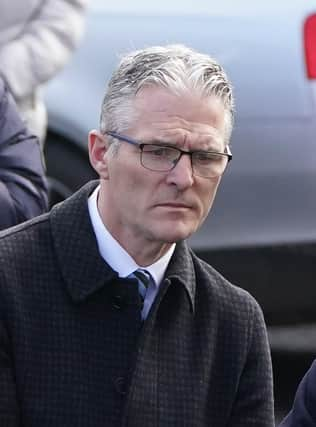Owen Polley: By citing nationalist grievances in bid for money, Jarlath Burns shows that the GAA is a sporting organisation like no other


In fact, Jarlath Burns went further, implying that money for Casement Park could not make up for Britain’s conduct in Ireland, but was nevertheless a ‘moral obligation’ on UK ministers.
If he hoped to portray the GAA as an organisation that mixes its sporting functions with political partisanship, Irish nationalist grievance-mongering and an overweening sense of entitlement, then Mr Burns achieved his aim. But the rest of the interview suggested that he wanted unionists to take a very different view. That charm offensive, which included praise for the Orange Order, was fatally undermined by these more direct and revealing comments.
Advertisement
Hide AdAdvertisement
Hide AdBy way of a recap, the cost of rebuilding Casement Park was originally calculated at £77 million, but after years of delays, safety concerns and planning challenges, it is now estimated at up to £300 million. The GAA thinks that Westminster should make up the vast majority of this shortfall, despite other sporting organisations receiving nowhere close to that sum for their equivalent building projects, even allowing for inflation.
During his conversation with William Crawley, Mr Burns gave supposed examples of British misbehaviour to support his argument. The government, he said, had “never apologised” for the Black and Tans killing 14 people at Croke Park in 1920, in an incident that became known as ‘Bloody Sunday’.
It was startling, given the complicated, contested and often violent history of this island, that Britain was effectively being asked to atone for an attack more than a century ago by funding an over-priced sports facility.
It also ignored the underlying context – this event occurred during a period when Irish separatists were waging a bloody, terrorist ‘war of independence’ against the UK – in a way that showed that the GAA won’t allow sport to be separated from republican myths.
Advertisement
Hide AdAdvertisement
Hide AdAs if to underline that point, Mr Burns talked about more recent history, including the Troubles in Northern Ireland. “A lot of very, very dangerous signals are being sent out to our community in recent times,” he said, “by events which have happened around… coroners’ inquests. And I think it does behove the British government to send out a signal to the GAA – ‘we aren’t anti-you, we do understand the incredible role you play in community and health and cohesiveness… therefore we are going to do this for you.” (I.e. foot the bill for Casement Park)
The implication was that the state colluded with loyalists to murder GAA officials and owes the organisation some form of compensation. It was an interpretation that drew, at least in part, on republicans’ relentless efforts to distort the history of the Troubles. Inquests and lawfare have been used to suggest that it was the state, rather than terrorists, who were the main instigators of violence.
By using this argument, the GAA president was clearly not trying to distance his organisation from its politicised, one-sided, non-inclusive image. Instead, he was doubling-down on those traits and hinting that it was entitled to government money precisely because of its unashamed Irish nationalist ethos, with all the connotations of self-perceived victimhood that carries.
This newspaper has charted in detail the scandal of ‘legacy’, the meaninglessness of the term ‘collusion’ and the one-sided way in which legacy processes have been used to attack the security forces rather than hold terrorists to account for their crimes. To listen to Mr Burns, though, you could not have told that this was such a hotly contested topic.
Advertisement
Hide AdAdvertisement
Hide AdIf the GAA’s record on the Troubles was spotless, perhaps he could be forgiven for that lack of nuance. On the contrary, clubs and tournaments that fall under its auspices continue to commemorate or celebrate republican terrorism.
The Kevin Lynch Hurling Club in Dungiven was named after an INLA gunman, while the Clonoe O’Rahillys Club in County Tyrone hosts a memorial to three dead PIRA men, unveiled in 2022. The Joe Cahill gaelic football competition, named after a PIRA founder, is contested by children under 11 years old, in an example of the moral rot that militant republicanism passes down through the generations.
These are just a small sample of links between the GAA and violent Irish separatism, but the president explained these away as stemming from the organisation’s ‘love of place’.
Rather than making a reasonable case for funding, Burns’ interview highlighted some of the problems and contradictions at the heart of his organisation. When it suits, the GAA portrays itself as a sporting body that is open to all and plays a healing role in our society. At the same time, its president launched deeply politicised arguments, attacking Britain’s government and implying that it is due compensation for perceived misconduct against one community.
Advertisement
Hide AdAdvertisement
Hide AdIt is almost impossible to imagine the Irish Football Association or the Ulster Branch of the Irish Rugby Football Union using old grievances in this way, or delivering a politically loaded reading of history to back up their claims for more government money. But then the GAA is a sports organisation like no other. Though it is no longer fashionable, even among many unionists, to point this out.
The fact is that the GAA was entitled to government money to modernise its facilities, which was provided to football and rugby as well, but it was unable to bring its plans to fruition. It remains entitled to a comparable sum, perhaps corrected for inflation.
There is a strong case that it should get no more, particularly if its arguments for more funding are based on peddling nationalist grievances and a warped history of the Troubles.